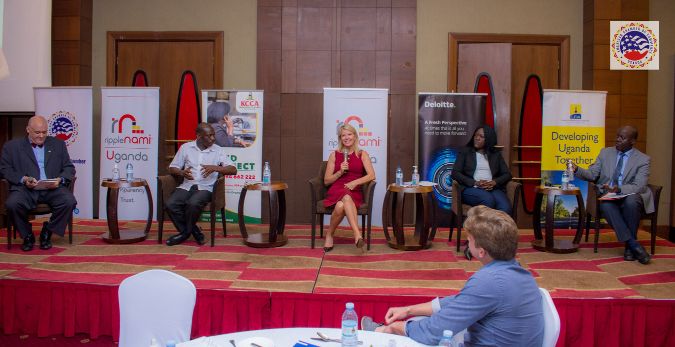UGANDA, Kampala | Real Muloodi News | Only 8% of rental income tax is collected in Uganda, leaving most rental income untaxed, according to Ms Jaye Connolly-LaBelle, the Chief Executive Officer and Chairperson of RippleNami Inc.
Ms Connolly-LaBelle was speaking at the AmCham Tax Forum CEO Breakfast meeting in Kampala. She further said “92% of rental income is not taxed, which denies government close to Shs710b annually”.
Last year Ms Connolly-LaBelle’s company signed a contract with the Government of Uganda to develop software to aid in rental tax collection. The Rental Tax Compliance System (rTCS) will track properties to real owners and create a database enabling Uganda Revenue Authority (URA) to investigate individuals and companies that owe rental income tax.
“We are working very closely with the URA, and the problem we are trying to solve is tax compliance. It’s not that there is a need to increase taxes; it’s just that there needs to be visibility as to compliance,” says Ms Connolly-LaBelle.
“If we look at Uganda, it has over 40 million people, and it’s imperative for everyone to pay their taxes. We are from the land of America, the land of taxation – we hate paying taxes. But we do it as an obligation because you have to grow your middle income. It’s the only way you become a sovereign nation and get off debt,” she said.
Mike Davis, President of AmCham Uganda, said “Right now there are 1.5 million TINs, but there are 44 million people in Uganda. So there is a large gap of tax payer compliance just there.”
Also speaking at the forum was Ms Patronella Namubiru, the Associate Director of Deloitte Uganda. Ms Namubiru explained that “If people think they have an opportunity not to comply, they will take it. Rental tax is a self-assessment tax; you assess yourself and make payment”. She added “Technology will ease tax collection, as well as enable URA to penetrate the real estate sector, which has since the introduction of rental tax, presented a number of challenges.”
In the last five years, the government has found it challenging to collect rental tax because of a lack of data about the sector. rTCS will help the government gather the necessary data to enforce compliance.
Uganda has seen significant growth in the real estate sector in the last 20 years, which contributes to 13% of the GDP.
The Parliament has also recently amended the Income Tax (Amendment) Bill 2021, which proposes to tax rental income at a rate of 25 per cent, while allowing 75 per cent as deductible/allowable expenses and losses. Currently, individuals are taxed at a rate of 20% and corporations 30%. The new rate of 25 per cent will apply to individuals and companies equally. This will come into effect July 1st, 2021.
Ms Connolly-LaBelle explained that the “current rental income tax collection is too low to attract meaningful investment in real estate.”
Technology to Improve Tax Efficiency
In the last five years, URA has invested in developing digital solutions to collect more taxes. Some of these solutions include the Rental Tax Compliance System, and the Digital Tax Stamps and Electronic Fiscal Receipting and Invoicing Systems.
James Odong, Assistant Commissioner, Process Management, Domestic Taxes said “We are now focusing on the use of data to follow up with the compliance of taxpayers.” He said “We are partnering with RippleNami to enhance our capacity to use the data that we source from all the Uganda MDAs that collect data about specific taxpayers, in terms of what they earn from the various properties they own.”
Mr John Rujoki Musinguzi, URA Commissioner General, recently said the rTCS system was part of a larger plan in which the agency would use technology to improve tax efficiency and service delivery. He said the system would help URA settle the persistent complications in identifying the right landlords of properties, and the income generated from rented properties.
READ MORE LIKE THIS:



